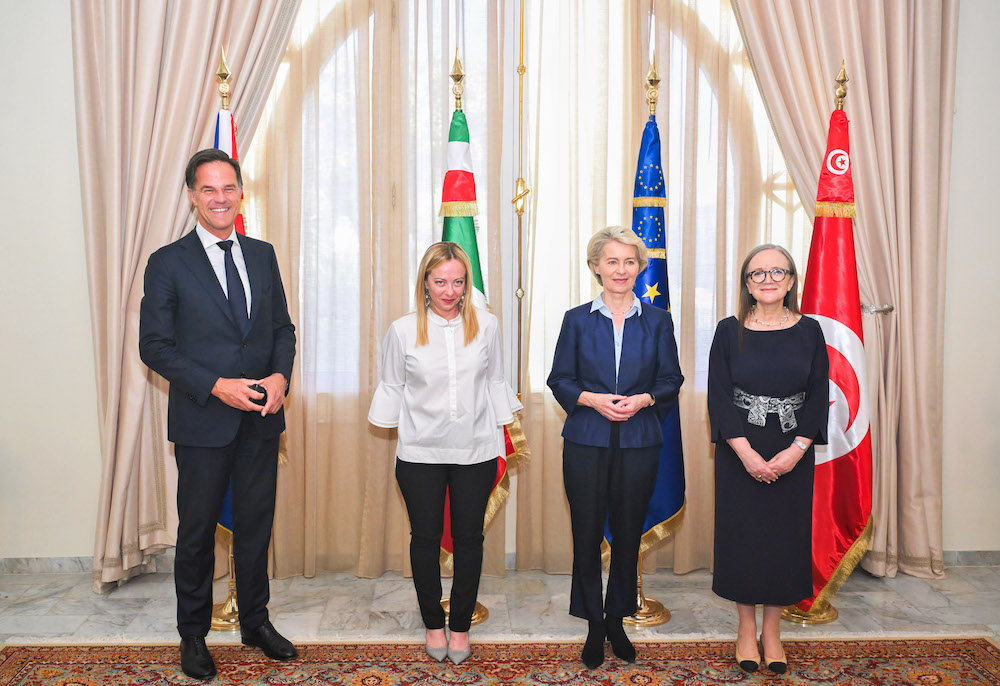
EU-Tunisia Memorandum: the European Union endorses illegal raids, deportations and violence against migrants
July 20, 2023On Sunday 16 July, the European Union signed a Memorandum of Understanding with Tunisia. Migration management is one of the five pillars of the agreement: the EU pledges to provide an additional EUR 100 million to Tunisia to strengthen border management, search and rescue operations at sea and ‘anti-trafficking’ measures to reduce the number of arrivals from the country. The securitarian rhetoric and the fight against the ‘root causes of migration’ waved by the Commission barely disguises its intention to block all forms of mobility from Tunisia to Europe, with the consequence of preventing asylum seekers from accessing the right to asylum.
Since the beginning of the year, 44,151 people have arrived in Italy from Tunisia and only a fraction of these are of Tunisian nationality: more and more people from West Africa are coming to Italy to escape the situation of increasing racism and institutional violence they are experiencing in the country.
The signing of the agreement endorses the measures taken by Tunisian authorities in recent months. The institutional racism, which draws on theories of so-called ethnic replacement theory, has taken the form of serious violations of fundamental rights by the authorities:
- Violence, raids and extrajudicial detentions against the population of sub-Saharan origin, which has been subjected to brutal attacks, even by the population, remained unpunished.
- The illegal deportation of hundreds of people of sub-Saharan origin to the military border areas with Libya and Algeria, where migrants are inaccessible to civil society organisations and humanitarian organisations, and where they also risk being subjected to further violence.
- Attempts by migrants to flee the country are hindered by a reinforced Tunisian Coast Guard, largely funded and equipped by Italy and the EU, which in recent months has increased operations of departure monitoring and interceptions at sea. There are several reports describing violent and dangerous ways in which the Coast Guard intercepted and brought ashore. Stealing engines from boats then left adrift, performing rigging around boats to cause waves and block their navigation, using tear gas during interceptions, are some of the practices that have in some cases resulted in the death of people on board.
The signing of the Memorandum with Tunisia ratifies the EU’s complicity with Tunisia’s violent policies towards migrants and violates the rules and principles that – at least in theory – bind the EU itself.
Under the conditions described so far, how can Tunisia be considered a safe country for third country nationals or even for its own citizens? How can it be considered a ‘safe’ place for the disembarkation of people rescued at sea, especially for third countries citizens?
With due differences, the dynamic that is developing seems to have disturbing points in common with the Libyan model as much in the way it is implemented as in its consequences. As for the former, this is yet another agreement between actors of international law that is dangerously removed from the rules of treaties and internal constitutional systems: no publicity during the negotiations, no control, no ratification by representative bodies. As for the consequences, this agreement also has the effect of systemising indiscriminate violence as a means of deterring mobility, an increasing role for an unscrupulous Coast Guard, a systematic and progressive erosion of the right to asylum through humanitarian instruments that have no real impact in terms of rights.
In view of this situation we call upon:
The European Commission and the Italian government to immediately stop the implementation of the Memorandum and any funding aimed at strengthening border control authorities;
The Tunisian government, to immediately suspend the forced transfers of migrants to the desert border areas with Libya and Algeria, which expose people to inhuman and degrading treatment and represent collective expulsions prohibited by international law; to guarantee the right to escape by land and sea, avoiding further endangering people’s lives in violent interception operations of migrant boats;
International organisations, primarily UNHCR and IOM, to suspend all forms of cooperation with the Tunisian government aimed at migration management and to take a public stand against the Memorandum;
The African Commission to launch a fact-finding mission to verify the conditions and actions denounced by migrants in the country;
The United Nations to organise a fact-finding mission to verify the violation of human rights;
To the governments of the countries and all humanitarian actors including the international organisations that will meet in Rome on 23 July in the framework of the International Conference on Migration to stop all actions aimed at blocking mobility and thus infringing on the right to asylum, and all actions to support instruments to control and deter migration involving serious human rights violations;
The EU Parliament to claim the role of co-legislator conferred upon it by the Treaties, in particular by Art. 78 c. 2 (g) TFEU, and to exercise its power of control over the Memorandum and its implementation;
The Italian Parliament to strengthen its role of scrutiny and control over the increasing expenditure that Italy has allocated in recent years to strengthen Tunisian border control through the Return Policy Reward Fund.
Organizations:
Forum Tunisien pour les Droits Économiques et Sociaux (FTDES)
Avocats Sans Frontières (ASF)
Associazione per gli Studi Giuridici sull’Immigrazione (ASGI)
Un Ponte Per (UPP)
Action Aid
ARCI
EuroMed Rights
Watch the Med – Alarm Phone